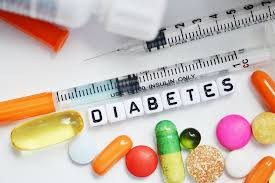Diabetes (diabetes mellitus) is a condition caused by the failure to regulate blood sugar in the body. The hormone insulin is key to managing the amount of sugar (glucose) in the blood. If a gland called the pancreas does not secrete enough insulin or the cells of the body become resistant to the effects of insulin, blood sugar levels will not be controlled the way they should be.
Without the proper functioning of insulin, sugar cannot enter muscle or fat cells, this may cause serious secondary complications including heart disease, stroke, kidney disease, neuropathy and other complications.
How many types of diabetes are there?
Typically, diabetes is split into two main types, however, research has progressed over recent years with some research suggesting diabetes may be seen as five separate diseases – this study potentially paves the way for more personalised treatment. However, while these results look promising, further research is necessary before changes may be made to the way diabetes is managed. Currently, the NHS classifies diabetes into two main types, these are:
Type 1 diabetes – an insulin-dependent condition, this is less common and usually develops before the age of 30.Type 1 diabetes occurs when the pancreas stops producing insulin. The exact cause is unknown but some believe it is an autoimmune response in which the body attacks its own pancreatic cells. People with type 1 diabetes need to take insulin for life.
Type 2 diabetes – a non-insulin dependent condition, originally more common in later life it is now increasingly prevalent in younger generations. In type 2 diabetes, the pancreas still produces insulin but either it is not producing enough or the body does not respond to it properly. The most common cause of type 2 diabetes is being overweight or obese.
In many cases, type 2 diabetes can be avoided by eating a healthy, balanced diet and taking regular exercise, it may often be managed in the same way if diagnosed. However, some cases will require medication and your doctor should be the one to determine whether this is appropriate.
Research has reported interesting evidence to support the reversal of type 2 diabetes. Funded by Diabetes UK and performed by a team at Newcastle University the study reported that type 2 diabetes may be reversed by an extremely low-calorie diet (600 kcals per day). New findings from a three-year extension of the study has since reported that nearly a quarter (23%) of participants who were in remission from type 2 diabetes at two years in the original trial, remained in remission at five years.
This diet is extreme and Diabetes UK strongly recommends that such a drastic diet is only undertaken under professional medical supervision. People with diabetes who want to lose weight should consult their GP before undertaking any new eating plan.
What are the symptoms of diabetes?
These can vary from tiredness, thirst and frequent urination to skin infections and cuts and wounds that take longer to heal. A full list of symptoms can be found at diabetes.co.uk
What are the health implications of diabetes?
People with either type 1 or 2 diabetes have a higher chance of developing a range of health conditions including heart disease, stroke, high blood pressure, circulation problems, nerve damage and damage to the kidneys and eyes.
If you are overweight or obese then losing this excess weight healthily and steadily may have a very positive effect on blood sugar levels and may reduce the risk of developing type 2 diabetes. If you already have type 2 diabetes losing weight may mean you need less or no medication for your condition and you will reduce your risk of cardiovascular disease.
It's also important to build exercise into your routine, as this will help support your body in its ability to maintain stable blood sugar levels. Simply increasing your step count may lower blood pressure and improve blood sugar levels. Check out all the benefits of regular walking.
Source: Jo Lewin (A registered Nutritionist)





